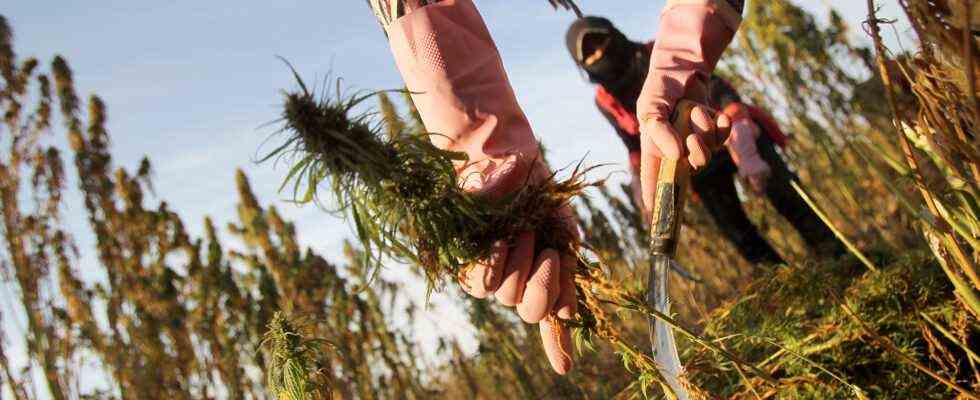report
Status: 11/20/2021 02:07 am
In the Lebanese Bekaa Plain, cannabis is grown almost exclusively. The hashish cultivated there is in great demand internationally. The only question is who will ultimately benefit from the export of the “Red Lebanese”?
Up here there only seems to be sun-bare mountains, fresh air and a few shepherds who drive their herds of goats down to the Bekaa plain. It is late autumn, the first snow will soon fall in this area, then the path will become impassable. The road winds down in serpentines and leads past harvested cannabis plantations to Yammoune.
It is a prosperous town where something new is constantly being built, streets, houses, a cistern in the center. “There are about 5,000 people living here in the village, and they all belong to one family – the Sheref family. There is only us here – the Shereffs,” reports Talal Sheref.
In Yammoune he is the rais beladija, a kind of mayor – or tribal leader. At least the one who is in charge here. A short, somewhat chilly looking man who has no problem calling things by their names: “The people here only plant hashish. Nothing but hashish. Why do they do that? Yammoune is 1,600 meters high. The climate is harsh. We tried to grow all sorts of things. Potatoes, apples … It didn’t work, the trees hardly had any apples. Only cannabis grows here. So people have been growing hashish. For 100 years. ”
Talal Sheref: Mayor clan chief or tribal leader. Just drug lord, he’s not, he says.
They cut the hemp back in September this year. Now it is on display in the garages for drying and further processing. It is said that around 30,000 farmers in the Bekaa earn their living with hashish. Who do the farmers sell to? “To smugglers,” says Sheref, “mostly Lebanese. They take the hashish out of the country and smuggle it into Europe. The smugglers make the big money, not the farmers. The farmers earn an average of $ 100 a kilo. But the smugglers get it in Holland or Germany twenty times as much. “
Under the control of Hezbollah
Lebanon is a hub of the global drug trade, and the Bekaa Plain is one of the centers for cannabis cultivation. The high plateau, which borders Syria in the east, is largely controlled by Hezbollah. The Shiite militia supported by Iran is the dominant force in the unstable Lebanese power structure. As a battle-tested militia, it has tens of thousands of fighters and an estimated hundred thousand missiles.
Hezbollah also maintains dozens of hospitals and schools and can present itself as a law enforcement and benefactor in the failed Lebanese state. 70 percent of their expenses are allegedly covered by Tehran. Hezbollah finances the rest through donations, money laundering and drug deals, say American and European anti-drug authorities.
The only problem is: the evidence is missing. “There are no direct links between drug traffickers and Hezbollah to be proven,” says a political analyst, whose name cannot be mentioned for security reasons, but is available to the editors. “Hezbollah members connect with drug trafficking tribes and families. They marry, become part of the extended family. And those families then donate money to Hezbollah. This system is difficult to get at,” he said.
In the EU and the US, Hezbollah is rated as a terrorist organization. Because it is so difficult to see through the networks and informal structures of Hezbollah, Western intelligence services also compare it to the Mafia.
Drugs for Unbelievers – Part of a Religious Ideology
“It’s not a mafia, it’s basically more dangerous than the mafia,” says the political analyst. “You can negotiate with the Mafia, but you can’t do that with Hezbollah. It follows a religious ideology. As a Muslim, you may not take drugs, but you can sell them to unbelievers with a clear conscience. You should even do it . It is part of the struggle against the enemies of Islam. ”
Allegedly, Hezbollah is now said to have deposited over two billion dollars from drug deals in accounts around the world. There is no evidence for this either, but it would not be surprising by Lebanese standards.
“The government turns a blind eye”
Even in the civil war years 1975 to 1990, the hashish business was one of the most important sources of income for the militias. The Christian Forces Lebanaise earned just as much from it as did the Druze, Sunnis or Shiite militias. The warlords from back then are still there. Only today they are ministers, parliamentarians, party leaders who occupy and ruin the political system. The country is sinking into an economic abyss, the currency is falling apart, the energy supply has collapsed.
But what is still working well is the cannabis business. “The government turns a blind eye, it leaves the people alone,” says Talal Scheref. The Mayor of Yammoune smiles a fine smile. Yes, there are also a few shootings between farmers and police officers. But otherwise: blind eyes. The mayor of Yammoune was recently dubbed a drug lord in a Western newspaper. That offended him badly. He’s not a drug lord, he says, but a representative of the Lebanese state.
Legalize? Hash in the Bekaa plain
Martin Durm, SWR, November 19, 2021 2:34 p.m.

